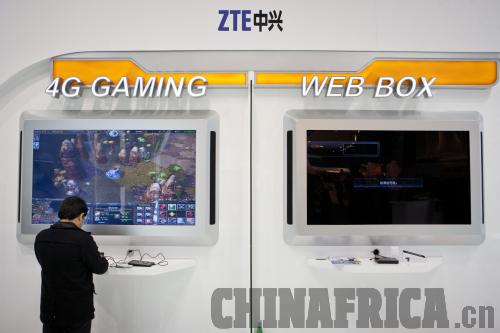|
 |
|
EXHIBITION: A man visits the ZTE booth at the 7th Mobile World Congress in Barcelona, Spain |
A jousting with no winner
Nobody knows whether the report published by the U.S. Congress will trigger a telecommunications trade war between China and the United States.
In 2011, the United States made up $1.3 billion, or 4 percent, of Huawei's total revenue, and $30 million of ZTE's. Huawei is second only to Ericsson in the manufacturing of routers, switches and other telecom equipment, and ZTE ranks fifth. In contrast, 16 percent of Cisco's revenue comes from the Pacific Rim and China, and for Cisco, China is also the second fastest growing market in the region after Japan. Currently, China accounts for 30 percent of Cisco's overall profits, while the United States makes up 45 percent. If a trade war breaks out, Cisco would have far more at stake than Huawei.
Furthermore, the report has tarnished the image of doing business in the United States. In the eyes of the Chinese people, the United States is a leader in free economy practice. However, its protectionist actions following the financial crisis have been disappointing.
The biggest worry for Huawei and ZTE is not losing the U.S. market but the possibility of U.S. allies following suit.
Canada and the UK announced on October 12 their own investigations into Huawei and ZTE-made telecom products. With Huawei's presence in countries like Canada, the UK, Germany, France and Australia–all U.S. allies–any domino effect could have a devastating impact on the company.
Headquartered in Shenzhen, Huawei is a privately owned enterprise. In its infancy, Huawei invited IBM to help build its core operating departments, such as R&D, product development, its supply chain and financial management, and IBM sent over roughly 200 consultants to do the job. Huawei's success is largely attributed to its cooperation with IBM.
On October 9, Chinese Ministry of Foreign Affairs declared the establishment of its Department of International Economy. One major function of the new department is to settle emerging international economic disputes interwoven with complicated political issues, which may prove helpful to Huawei and ZTE.
Introspection needed
Chen Yongdong, an associate professor and independent scholar in information management, e-commerce and new media, suggests that since the American Government believes the Chinese Government has much bearing on Huawei and ZTE, their normal commercial activities are under constant surveillance.
However, concerns over alleged "security threats," which has been amplified by the American Government, might cost the United States more lost business opportunities and profits.
Chen believes the Chinese Government should use the Huawei case as an opportunity to reflect. China has the most open telecommunications market in the world. Protectionism barely exists. Almost all telecom firms try to make a fortune here, with some having achieved great success. China treats enterprises of different nationalities equally without discrimination.
In stark contrast to Chinese enterprises struggling in the U.S. market, American telecom firms, represented by Cisco, are sailing smoothly in China. A handful of foreign companies, like Cisco, Intel, Microsoft, Motorola, IBM, HP and Apple, have swallowed a large share of the Chinese market. Cisco-manufactured telecom equipment has been widely used by households and by the government in fields like education and commerce. But in the United States, Chinese equipment will likely be barred from government use.
If China were to treat American firms the same way, it would be impossible for Cisco to enter China's IT telecommunications equipment market. It is worth asking why the United States–a country that regularly extols the virtues of global free trade–behaves the way it does toward Chinese firms.
"When we open up to countries with ulterior motives and our generosity is met with scrutiny and obstruction, should we also need to enhance our national security awareness?" asks Chen. |